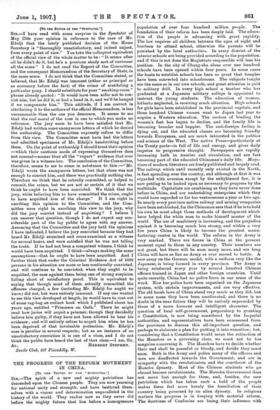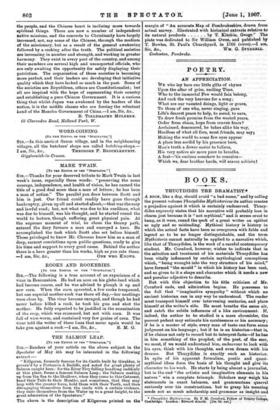THE PROGRESS OF THE REFORM MOVEMENT IN CHINA.
(To THO SOITOR OP VIM .SPION'ATOIL1
Sta,—The spirit of a new and mighty patriotism Las descended upon the Chinese people. They are now yearning for national unity and strength, and have bestirred them- selves with a vigour and determination unparalleled in the history of the world. They realise now as they never did, before the mighty future that lies before a homogeneous population of over four hundred million peeple. The foundation of their reform has been deeply laid. The educa- tion of the people is advancing with great rapidity. The kw requires all children between the ages of eight and fourteen to attend school, otherwise the parents will be , punished. by the local authorities. In every district of the interior schools are being provided according to the population, and if this is not done the Magistrate responsible will lose his position. In the city of Chang-sha alone over one hundred schools have been opened within four years. In some cases the haste to establish schools has been so great that temples have been converted. into schoolrooms. The subjects taught are the same as in our own schools, and great attention is paid to military drill. In every high school a teacher who has graduated at a Japanese military college is appointed to instruct the young students. The education of women, hitherto neglected, is receiving much attention. High schools for girls have been established in the provincial capitals, and three hundred Chinese women went to Japan last year to acquire a Western education. The custom of binding the women's feet has begun to decline, and the family life is becoming broader and. happier. The anti-foreign feeling is dying out, and the educated classes are becoming friendly towards Europeans, and are much interested in the politics and science of the West. The native Press—particularly at the Treaty ports—is full of life and energy, and gives daily impetus to progressive thought. Newspapers are rapidly increasing both in number and. circulation, and. are fast becoming part of the educated Chinaman's daily life. Maga- zines of modern literature arc freely published and largely read. The railway, which until recently only existed in the North, is fast spreading over the country, and. although at first it was regarded with aversion except by the enlightened few, it is now getting to be looked upon as necessary to progress by the multitude. Capitalists are combining as they have never done before in China, and. are undertaking enterprises which they would have regarded as far too venturesome a year or two ago. In nearly every province native railway and mining companies have been established, for the Chinaman sees that if he is to hold his own he must adopt those methods of development which have helped the white man to make himself master of the world. The use of machinery is increasing, and the prejudice against it is becoming much less strong, and within a very few years China is likely to become the greatest manu- facturing centre in the world. The reform in the Army is very marked. There are forces in China at the present moment equal to those in any country. Their numbers are not great, but there will be soon many more, and ere long China will have as fine an Army as ever moved to battle. A new army on the German model, with a uniform very like the Japanese, is being formed in every province. The Army is being reinforced every year by several hundred Chinese officers trained. in Japan and other foreign countries. Until quite recently, China had no police force in our sense of the word. Now her police have been organised on the Japanese system, with certain improvements, and are very effective. The old harsh laws of China stand very much as they did, but in some cases they have been ameliorated, and there is no doubt in the near future they will be entirely superseded by those of a more humane and intelligent character. The question of local self-government, preparatory to granting a Constitution, is now being considered by the Imperial authorities, and representatives have been summoned from the provinces to discuss this all-important question, and perhaps to elaborate a plan for putting it into execution; but, considering that a Constitution would mean the extinction of the Manchus us a governing class, we must not be too sanguine concerning it. The Manchus have to decide whether their end shall be peaceful or bloody, and decide they must soon. Both in the Army and police many of the officers and men are disaffected towards the Government, and mire in sympathy with the revolutionists and the overthrow of the Manchu dynasty. Most of the Chinese students who go abroad become revolutionists. The Manchu Government does not move fast enough for them, and, besides, the new patriotism which has taken such a bold of the people makes them feel more keenly the humiliation of their country being governed by an alien dynasty. In religious matters the progress is in keeping with material reform. , The doctrines of Conti/eine are losing their -influence WO the people, and the Ohinese heart is inclining more towards spiritual things. There are now a number of independent native missions, and the converts to Christianity have largely increased, not, say some of the Chinese, through the medium of the missionary, but as a result of the general awakening followed by a seeking after the truth. The political societies are increasing in number and strength, and working in greater harmony. They exist in every part of the country, and among their members are several high and unsuspected officials, who are only awaiting the opportunity for safely displaying their patriotism. The organisation of these societies is becoming more perfect, and their leaders are developing that initiative quality which they have lacked so much in the past. Some of the societies are Republican, others are Constitutionalist; but all are inspired with the hope of regenerating their country and establishing a pure Chinese Government. It is a curious thing that whilst Japan was awakened by the leaders of the nation, it is the middle classes who are forcing the reluctant Land of the Manchu Government of China.—I am, Sir, Sm.,
R. TOLLEMACHE livreiteew.
66 Clarendon Road, Holland Park, W.







































 Previous page
Previous page